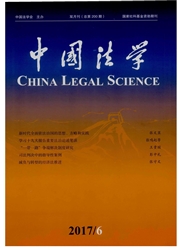

 中文摘要:
中文摘要:
中国正处于现代化转型以来腐败治理的重要转折点与战略机遇期,积极推进国家反腐败立法战略转型与体系化构建,实现反腐败立法由形式治理向实质治理功能的转化,是破解当下"中国式"腐败治理困局之关键。科学评估反腐败立法治理能力的状况,确立"积极治理主义"理念在国家腐败治理体系中的首要地位,创新由国家法与政党法"二元"规范体系与衔接机制,创立国家腐败治理基本法、分步推进体系完善,是推进中国反腐败立法战略转型的必然选择。明确立法原则,实施功能立法,公布立法清单,实施重点化构建、系统化推进、协同化衔接,形成以《反腐败法》为中心,重点预防性立法为支撑、控权性法律相配合的多层次、立体化、综合化的反腐立法体系,是中国反腐败立法之体系化构建的核心。
 英文摘要:
英文摘要:
China is at an important turning point and strategic opportunity period of corruption fight since modernization transformation. The crux to crack current predicament of Chinese corruption control is to proaetively propel the strategic transformation and systematic construction of anti-corruption legislation, realizing its change from form administration to substance administration. To scientifically assess the curbing ability of anti-corruption legislation, establish the primary status of active management concept in national corruption management system, innovate binary normative system and convergence mechanism of state law and party law, as well as establish fundamental law of national corruption administration and boost mechanism improvement step by step are inevitable for the strategic transformation of China's anti-corruption legislation. The kernel of the establishment of China's anti-corruption legislation system is the build of a multi-level, three-dimensional and comprehensive anti-corruption legislation system centered on Anti-Corruption Law, supported by emphasized preventative legislation and coordinated with power-control regulation via clear definition of legislation principles, functional legislation implementation, legislative list publication, as well as implementation of priority construction, systematic advancement and collaborative connection.
 同期刊论文项目
同期刊论文项目
 同项目期刊论文
同项目期刊论文
 期刊信息
期刊信息
